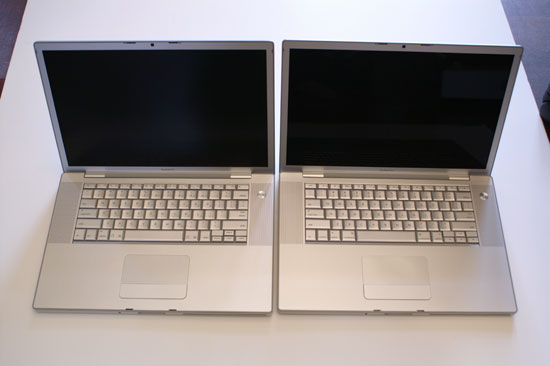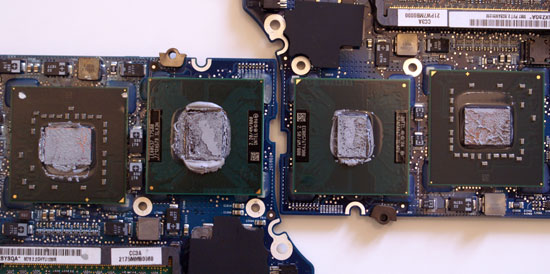
Original Link: https://www.anandtech.com/show/2459
Apple's New Penryn MacBook Pro: Dissected
by Anand Lal Shimpi on February 26, 2008 5:00 PM EST- Posted in
- Mac
Today Apple introduced its first MacBook and MacBook Pro notebooks based on Intel's 45nm mobile Penryn CPU. We've already looked at the mobile Penryn CPU and discovered that despite offering very little performance boost, its contribution to improving battery life was significant. We're hard at work on seeing how mobile Penryn stacks up in the MacBook Pro but we couldn't resist a look at its internals before then.

The old and new MacBook Pro are 100% identical from the outside:

The specs of the new MacBook Pro are as follows:
| New Penryn MacBook Pro 15" | Old Merom MacBook Pro 15" | New Penryn MacBook | Old Merom MacBook | MacBook Air | |
| Dimensions | H: 1.0" W: 14.1" D: 9.6" |
H: 1.0" W: 14.1" D: 9.6" |
H: 1.08" W: 12.78" D: 8.92" |
H: 1.08" W: 12.78" D: 8.92" |
H: 0.16-076" W: 12.8" D: 8.94" |
| Weight | 5.4 lbs | 5.4 lbs | 5.0 lbs | 5.0 lbs | 3.0 lbs |
| Screen Size/Resolution | 15.4" / 1440 x 900 | 15.4" / 1440 x 900 | 13.3" / 1280 x 800 | 13.3" / 1280 x 800 | 13.3" / 1280 x 800 |
| CPU | Intel Core 2 Duo 2.4GHz - 2.6GHz (45nm Penryn) | Intel Core 2 Duo 2.2GHz - 2.6GHz (65nm Merom) | Intel Core 2 Duo 2.1 - 2.4GHz (45nm Penryn) | Intel Core 2 Duo 2.0 - 2.2GHz (65nm Merom) | Intel Core 2 Duo 1.6 - 1.8GHz (65nm Merom) |
| GPU | NVIDIA GeForce 8600M GT (256MB - 512MB) | NVIDIA GeForce 8600M GT (128MB - 256MB) | Intel GMA X3100 (144MB UMA) |
Intel GMA X3100 (144MB UMA) |
Intel GMA X3100 (144MB UMA) |
| Memory | 2GB - 4GB DDR2-667 | 2GB - 4GB DDR2-667 | 1GB - 4GB DDR2-667 | 1GB - 4GB DDR2-667 | 2GB DDR2-667 (fixed) |
| HDD | 200 - 250GB 2.5" 5400RPM SATA 200GB 7200RPM SATA |
120 - 250GB 2.5" 5400RPM SATA 200GB 7200RPM SATA |
120 - 250GB 2.5" 5400RPM SATA HDD | 80 - 160GB 2.5" 5400RPM SATA HDD | 80GB 1.8" HDD or 64GB 1.8" SSD |
| Optical Drive | Integrated SuperDrive | Integrated SuperDrive | Integrated Combo drive or SuperDrive | Integrated Combo drive or SuperDrive | Optional External USB SuperDrive |
| Networking | 802.11a/b/g/n 10/100/1000 Ethernet |
802.11a/b/g/n 10/100/1000 Ethernet |
802.11a/b/g/n 10/100/1000 Ethernet |
802.11a/b/g/n 10/100/1000 Ethernet |
802.11a/b/g/n |
| Built in iSight | Yes | Yes | Yes | Yes | Yes |
| Inputs | 2 x USB 2.0 1 x FireWire 400 1 x FireWire 800 1 x ExpressCard/34 1 x Audio in 1 x Integrated mic |
2 x USB 2.0 1 x FireWire 400 1 x FireWire 800 1 x ExpressCard/34 1 x Audio in 1 x Integrated mic |
2 x USB 2.0 1 x FireWire 400 1 x Audio in 1 x Integrated mic |
2 x USB 2.0 1 x FireWire 400 1 x Audio in 1 x Integrated mic |
1 x USB 2.0 1 x Integrated mic |
| Outputs | 1 x Audio 1 x dual-link DVI |
1 x Audio 1 x dual-link DVI |
1 x Audio 1 x mini-DVI |
1 x Audio 1 x mini-DVI |
1 x Audio 1 x Micro-DVI |
| Battery | 60WHr | 60WHr | 55WHr | 55WHr | 37WHr |
| Price | $1999 | $1999 | $1099 | $1099 | $1799 |
As you can see, not much has changed with these new notebooks. They get a slight bump in clock speed (but potential increase in battery life as well) combined with a larger hard drive.
The shining star of the new notebooks is Intel's mobile Penryn CPU, so let's take a closer look.
Taking apart the new MacBook Pro is virtually identical to the old one.

The motherboard layout hasn't actually changed, the reason we haven't seen the Penryn update until today is because there were some late changes to the voltage specs from Intel. The result was that all of the motherboards had to be slightly reworked resulting in a delayed release of mobile Penryn, despite the CPUs being announced at CES in January.

As always, the MacBook Pro motherboard is quite compact and a custom design. The four major chips can be seen above, from left to right we have the Intel ICH, NVIDIA 8600M GT GPU, Intel Mobile 965 MCH and the mobile Penryn CPU itself. Despite the CPU upgrade this is still considered to be a Santa Rosa based notebook, hence the identical chipset to what was in the old Pros.

The two MacBook Pro motherboards, as we mentioned before, are virtually identical. At the top you have the new board, and at the bottom we've got the old. The only real changes are a few resistors, caps and VRM adjustments. The new Penryn based board does feature more video memory standard, and thus you see a few more memory chips around the NVIDIA GPU.
And now it's time for the star of the show:

Here we're looking at the two MacBook Pro motherboards butted up against one another. In the middle we have the CPUs: 65nm Merom on the left and 45nm Penryn on the right. It's not tough to tell that Penryn is smaller thanks to the 45nm manufacturing process.
The real question is: how much of an improvement in battery life will we see? And that's what we're trying to find out now...













